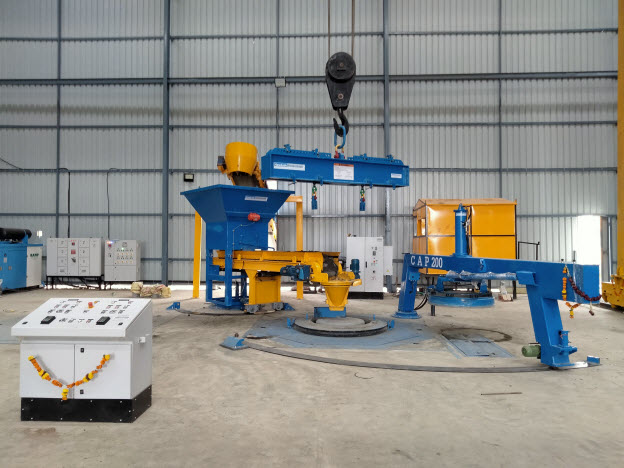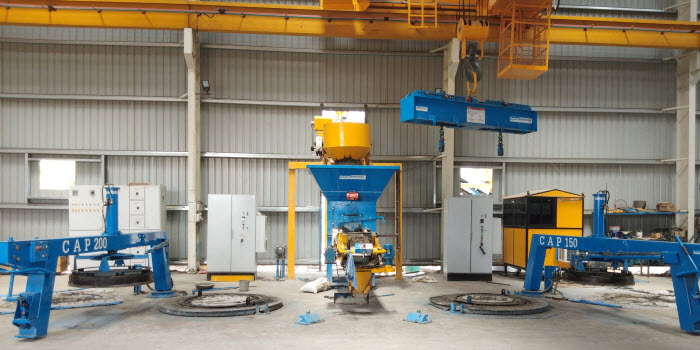
India’s rapid urbanization and infrastructure development have significantly increased the demand for efficient and durable construction materials. Concrete pipes are indispensable for infrastructure projects, including sewage systems, drainage networks, and water supply pipelines. This surge in construction activities has fueled the demand for concrete pipe making machines in cities across India. These machines are pivotal in producing high-quality concrete pipes that meet the needs of urban development projects.
This article explores the demand for concrete pipe making machines in different Indian cities, highlighting key trends, challenges, and opportunities in the supply chain.
Why Concrete Pipes Are Vital for Indian Cities
Concrete pipes are essential for building reliable infrastructure in urban and rural areas. Their durability, resistance to environmental factors, and cost-effectiveness make them a preferred choice for:
- Sewage systems.
- Storm water management.
- Irrigation channels.
- Industrial wastewater disposal.
The demand for concrete pipes is directly tied to urban development, necessitating an efficient and scalable production process enabled by concrete pipe making machines.
Demand for Concrete Pipe Making Machines in Indian Cities
1. Metropolitan Cities
Cities like Mumbai, Delhi, Bangalore, and Chennai are witnessing exponential growth in infrastructure projects.
Drivers of Demand:
- Expansion of metro rail networks.
- Upgrading sewage and drainage systems to meet population growth.
- Smart city projects requiring modern infrastructure solutions.
Preferred Solutions:
Large-scale concrete pipe making machines capable of high-volume production to meet the fast-paced demands.
2. Tier-2 Cities
Cities like Pune, Ahmedabad, Jaipur, and Lucknow are experiencing rapid industrialization and urbanization.
Drivers of Demand:
- Construction of industrial zones and residential complexes.
- Implementation of drainage and water supply projects under government schemes.
Preferred Solutions:
Medium-capacity concrete pipe making machines tailored for diverse project requirements.
3. Coastal Cities
Cities like Kochi, Visakhapatnam, and Mangalore require specialized concrete pipes to handle storm water and seawater exposure.
Drivers of Demand:
- Coastal protection projects.
- Improved drainage systems to combat flooding during monsoons.
Preferred Solutions:
Machines designed to produce corrosion-resistant concrete pipes.
4. Northern Plains and Agricultural Regions
Cities like Chandigarh, Ludhiana, and Kanpur rely heavily on concrete pipes for irrigation and rural water supply systems.
Drivers of Demand:
- Development of large-scale irrigation projects.
- Upgrading rural water distribution networks.
Preferred Solutions:
Affordable concrete pipe making machines for producing pipes in varying sizes to suit agricultural needs.
5. Industrial Hubs
Cities like Surat, Vadodara, and Jamshedpur have a high demand for industrial-grade concrete pipes.
Drivers of Demand:
- Efficient waste disposal systems for factories and industrial plants.
- Expansion of industrial parks requiring durable underground utilities.
Preferred Solutions:
High-capacity machines capable of producing reinforced concrete pipes for industrial use.

The Role of Concrete Pipe Making Machine Manufacturers
Indian concrete pipe making machine manufacturers play a critical role in meeting the demand for these machines by offering:
1. Custom Solutions
Machines designed to produce pipes of varying sizes and specifications to suit different projects.
2. Advanced Technology
Incorporation of automation and IoT for precision and efficiency in pipe production.
3. Cost-Effectiveness
Competitive pricing to cater to both large-scale urban projects and small-scale rural needs.
4. After-Sales Support
Comprehensive support, including installation, training, and maintenance, ensuring optimal machine performance.
Supply Challenges for Concrete Pipe Making Machines
Despite the growing demand, several challenges affect the supply chain of concrete pipe making machines in India:
1. High Initial Investment
The cost of large-scale concrete pipe making machines can be prohibitive for small contractors, limiting adoption in certain regions.
2. Logistics
Transporting heavy machinery to remote or inaccessible areas can be challenging, particularly in hilly or coastal regions.
3. Skilled Workforce
Operating advanced machinery requires trained personnel, which can be scarce in smaller towns and rural areas.
4. Customization Needs
Different cities have unique requirements based on their geographical and infrastructural challenges, necessitating highly customized solutions.
Opportunities for Manufacturers and Suppliers
1. Government Initiatives
Programs like Smart Cities Mission, AMRUT, and Jal Jeevan Mission are driving infrastructure development, creating opportunities for manufacturers to meet the demand for concrete pipe making machines.
2. Expanding to Tier-2 and Tier-3 Cities
Manufacturers can tap into the growing demand in smaller cities by offering affordable and portable concrete pipe making plants.
3. Technological Advancements
Developing machines with energy-efficient and automated features can attract cost-conscious buyers while enhancing production capabilities.
4. Export Potential
Indian manufacturers can explore export opportunities in developing countries with similar infrastructural needs.
Benefits of Using Concrete Pipe Making Machines
1. Precision and Consistency
Modern concrete pipe making machines ensure uniformity in size, shape, and quality, meeting stringent project specifications.
2. High Efficiency
These machines enable mass production of concrete pipes, reducing time and labor costs.
3. Versatility
From small drainage pipes to large industrial-grade pipes, machines can produce a wide range of sizes and designs.
4. Cost Savings
Efficient use of materials and reduced wastage contribute to lower production costs over time.
5. Sustainability
Machines designed to minimize energy consumption and material wastage align with environmentally conscious construction practices.
FAQs About Concrete Pipe Making Machine
A concrete pipe making machine is used to produce concrete pipes for various infrastructure projects, including drainage, sewage, and water supply systems.
The rapid urbanization, industrialization, and implementation of government infrastructure projects have significantly increased the need for durable and high-quality concrete pipes, driving demand for these machines.
Advanced machines ensure precision, reduce production time, lower material wastage, and enable the production of customized pipe designs.
Manufacturers offer customized machines designed for specific requirements, such as corrosion-resistant pipes for coastal areas or large pipes for industrial use.
Yes, many manufacturers provide medium- and small-capacity machines that are cost-effective and suitable for smaller projects in Tier-2 and Tier-3 cities.
Conclusion
The demand for concrete pipe making machines in India reflects the country’s growing focus on infrastructure development. From metropolitan cities to rural agricultural regions, these machines are vital for producing durable and efficient concrete pipes. By addressing supply challenges and leveraging technological advancements, manufacturers can meet the diverse needs of Indian cities, contributing to sustainable and robust infrastructure.
Read More Articles on Concrete Pipe Making Machine
Recent Articles
- Precast Concrete Box Culvert for Urban Underpasses and Cable Trenches
- How Concrete Pipe Machines Crucial in Power Plant Infrastructure?
- Role of Concrete Pipe Machines in Canal Lining Projects
- How Drycast Technology is Changing the Concrete Pipe Industry?
- Common Mistakes to Avoid When Selecting Pipe Moulds for Your Machine





 BACK TO ARTICLES
BACK TO ARTICLES